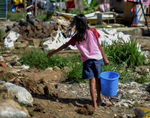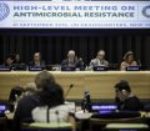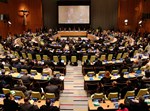Social Watch news
Published on Wed, 2016-10-05 09:41

Photo: A girl makes her way home
after fetching water at a coastal
village in Tacloban, Leyte province.
Photograph: Ezra Acayan/NurPhoto
/Rex
|
Three years after the typhoon destroyed more than a million homes and killed 6,000 people, the Philippines has fallen far short on house-building pledge.
When Typhoon Haiyan smashed into the city of Tacloban in the central Philippines almost three years ago, Arsenio was one of the lucky ones – he survived by swimming a kilometre to safety. “Every time there is a storm, I get scared, even after three years,” he said. “I don’t want to go through the same thing again.”
|
Published on Wed, 2016-10-05 09:37
BankTrack recently published the second edition of its “Banking with Principles?” report, evaluating the progress of global private sector banks towards integrating the UN Guiding Principles on Business and Human Rights into their policies, due diligence processes and reporting. The report is an update to our December 2014 benchmarking exercise, with its scope expanded from 32 banks to 45, and aims to uncover what progress has been made by the banks, 18 months on from the previous report and five years from the establishment of the Guiding Principles.
|
Published on Fri, 2016-09-30 21:52

Photo: UNDG
|
During the last few years Morocco has adopted some public policies that might help meet the 2030 Agenda objectives, but many challenges have to be confronted in order to ensure to proper and effective progress towards sustainable development.
The 2030 Agenda, negotiated by Member States, lays out goals and targets at the global level. Like other countries, Morocco needs to translate these into the national context, with a strategy designed to achieve local priorities. Efforts to achieve the SDGs may be hampered by the government’s persistence in carrying out neoliberal policies (privatization of public services such as education and health for example, austerity and public spending cuts) as part of its commitments to the International Monetary Fund. Similarly, monitoring and evaluating the action plans set out for delivery of the 2030 Agenda is crucial in achieving successes. Unfortunately, this practice is still uncommon in Morocco.
|
Published on Tue, 2016-09-27 15:35

Photo: UN
|
It may sound like an issue for health specialists, but at the UN high-level meeting on antimicrobial resistance (AMR) ministers and heads of state from around the world made clear that it is more than that it appears.
This is the fourth time that the UN General Assembly has addressed health issues. As the representative of Portugal pointed out, this meeting “is proof of global recognition of this problem and how important an issue it is”. Executive Director of South Centre, Martin Khor said that AMR is “as serious as Climate Change and perhaps more immediate”.
|
Published on Fri, 2016-09-23 22:33
The adoption of the 2030 Agenda by the UN coincided with a change of government in Argentina, which is reversing the public policies that were put in place to deal with the serious social, economic, institutional and political crisis of 2001 and 2002.
In its first months in power, the political coalition Cambiemos (Spanish for Let’s change) shifted away from a development model based on strengthening the domestic market, trade protectionism, expansion of social rights and an active role of the state in income redistribution through the collection of taxes on exports of agricultural products, towards a model favouring free trade, a competitive position in the global market, a lower level of state intervention in the overall economy and a reduction in taxes for the rich. Instead of continuing to expand social protection as required by the SDGs, the current government is aligning public policies with the interests of the sectors with greater political and economic power. The violation of various economic and social rights, which has occurred in a very short time, is creating a gradual and growing rejection within different social sectors.
|
Published on Fri, 2016-09-23 10:57

A session of the HLPF. (Photo: UN)
|
The 2030 Agenda is both a problem and a solution for the UN system. The UN, especially the UN development system, must be encouraged to return to its value-driven role in the public interest, grounded in the explicit adoption of norms and standards and delivered through programming that does not deviate from its core business. Otherwise it will find itself caught in a self-inflicted vicious circle of decline. “More of the same” will see the continuation of its shrinking role in global affairs at a time when so many challenges require international co-operation and resolve.
|
Published on Fri, 2016-09-23 01:20
Unfortunately, whenever civil society and government strike discussions on human rights a certain unease sets in. The mood quickly dampens. On one hand, government mounts a defensive posture and on the other, civil society embarks on an offensive strategy. This gets worse when you throw in the word taxation. Like a spark to an inflammable concoction, you have the perfect recipe for an explosive discussion.
|
Published on Fri, 2016-09-16 09:15
The 2030 Agenda and its 17 Sustainable Development Goals (SDGs) comprises a number of goals which concern the internal situation in Germany. Among these are goals which derive from the human rights obligations, such as in the areas of education, health and social security. Examples include reducing the proportion of poor people in Germany by half and increasing the proportion of young people who complete secondary education.
Other goals address the external effects of German politics and economy. They demand domestic measures which also have immediate impacts for people in the countries of the South. These include goals for reducing resource use, for changing unsustainable consumption and production patterns, but also for the relationship to migrants and refugees.
|
Published on Fri, 2016-09-16 09:10

Photo: Google
|
In Azerbaijan reduced budget revenues and cuts in government spending are the result of the decline in crude oil prices, the main export of the country. The Social Watch coalition in Azerbaijan examines how these constraints can also hamper the financing of sustainable development initiatives. As crude oil prices have tumbled, a worsening of the country’s fiscal balance could gradually lead to an increase in the public debt burden and threaten fiscal sustainability in the long term. Azerbaijan’s sovereign wealth fund, SOFAZ, now has very limited profits from the sale of oil, and will contribute less to the fiscal revenues of the state as a consequence. The national state-owned oil-gas company, SOCAR, temporarily cancelled its plans for a new oil-gas refining and petrochemical complex because of the rapid fall in crude oil prices. However, at the same time, the new low oil price environment also offers an opportunity to boost a new wave of fiscal and public administration reforms in Azerbaijan.
|
Published on Thu, 2016-09-15 14:43
The Fed Up campaign reached new heights last month when 120 community leaders and organizers from around the country sat down with ten of the Federal Reserve’s Presidents and Governors for an unprecedented on-the-record conversation about monetary policy and Fed governance in Jackson Hole, Wyoming.
Workers and community leaders from mostly Black and Latino communities in all twelve of the Federal Reserve’s regional districts left their homes and families to travel to Jackson Hole to tell the Fed that the economy is still not working for their communities. They all belonged to the Fed Up campaign, a coalition of labor unions and community groups that came together two years ago to advocate for a more democratized Federal Reserve.
|
SUSCRIBE TO OUR NEWSLETTER
Submit

|










